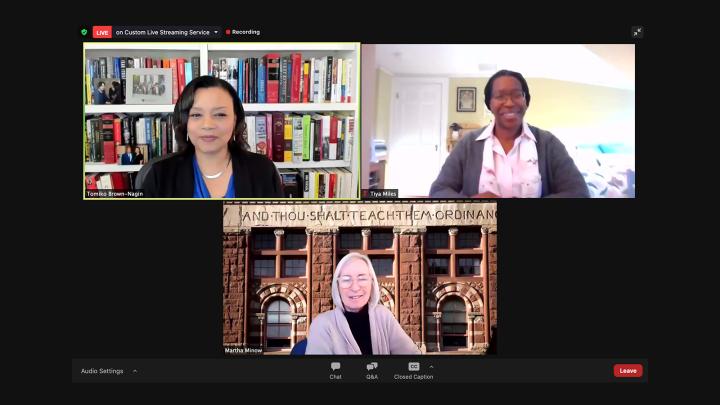A year and a half after President Lawrence Bacow announced an initiative to explore the legacy of slavery at Harvard, three members of the faculty committee overseeing that effort sat down on Tuesday for a virtual discussion and Q&A about the project and its progress—and on the current moment of racial reckoning. The event was hosted by the Radcliffe Institute, which serves as a base of operations for the University-wide initiative.
“This is a beginning; it’s not an ending,” said Tomiko Brown-Nagin, expressing a sentiment that echoed throughout the evening. The dean of the Radcliffe Institute and a scholar of the civil-rights movement and of inequality within the law, Brown-Nagin chairs the initiative’s faculty committee, which will produce a report this coming winter detailing its findings and recommendations. That won’t be an ending either, Brown-Nagin said.
The event’s other speakers concurred: Tiya Miles ’92, professor of history and a novelist whose scholarly and creative work has deeply explored issues of slavery in the United States; and Martha Minow, 300th Anniversary University Professor, former law-school dean, and an expert in human-rights law.
The professors offered several updates on the project’s research and deliberations. Committee members have formed four subgroups with specific, deeper focuses: on campus and community; on curriculum; on the University’s historical ties to slavery in Antigua and other nations; and on medical education and exploitation. Miles, who co-chairs the community-focused subcommittee, spoke of the importance of reaching out to people beyond Harvard’s campus, and of the humility required in that effort. She spoke of creating artwork and rituals related to the history of enslavement—a shared campus space for “recognition and education,” a graphic catalog, a collection of objects, a walking tour, perhaps a theatrical production—that would lend concreteness to the research and make its findings “impossible to ignore.” As part of that work, two other committee members, Geyser University Professor emeritus William Julius Wilson, and assistant professor of education Anthony Jack, are conducting surveys of current Harvard students who are descended from enslaved people, “to shed light,” Brown-Nagin said, “on how Harvard undergraduates have coped with the confluence of the racial reckoning, the public-health crisis, and economic distress.”
Minow, who co-chairs the curriculum subcommittee, spoke about the effort to produce course materials and teaching materials—as well as case studies and films—from the research into Harvard’s ties to slavery, “to make all of that much more readily available and usable for people who don’t currently touch on or deal with issues of slavery or Harvard’s experience with slavery in their own teaching.” Later, she added: “It’s not just developing materials and pointing to them, but thinking about teaching and learning and how to equip people on this campus who are engaged in this very important work of teaching—and learning to teach and learn—about Harvard and our legacies of slavery.”
Minow, Miles, and Brown-Nagin also meditated more broadly on the meaning of reckoning and repair, and the possibilities each might hold. Miles spoke of this in medical terms—as a diagnosis and prescription. “The brokenness that we’re looking at is so old, so deep-seated,” she said, “that it’s so difficult for us to actually put the pieces back together. And so we need as many tools as we can possibly imagine for the work.” The process requires patience to envision a long trajectory, but also an insistence on change “right now,” she said. “We have to insist upon change which is visible, which is measurable as a part of the repair process.”
Minow expressed a similar sentiment. The word “reckoning,” she argued, is richer and more resonant than “repair,” which implies a return to a previous whole. But the United States was founded in slavery, and “we are committed to a different future.” The idea of reckoning accounts for that broken past: “I flinch when I say the word, that people were ‘owned,’ but if we don’t face up to it, then we haven’t dealt with the past—the property system in the United States that not only made it lawful for people to own other people, it used the enormous powers of the federal government to enforce those property rules. And if we don’t face up to that, then we’re not actually addressing the ways in which the legal system itself reinforces what is unjust.”
Earlier, Minow had reminded her audience of a fact that she regularly brings up in her law-school classes: “I always say to the students, ‘We are giving you the tools to use the law, but everything that [Law School benefactor and slaveholder ] Isaac Royall did and that Harvard did was perfectly legal. So, if we only do what’s legal, that's inadequate. We have a bigger obligation than that.’”









